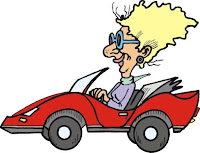My lifelong friend Ruth is allowing me to practice driving
in her 2003 green Honda Accord. "I have to be able to see over the
steering wheel," I tell her. She raises the driver's seat as as high as it
can go.
I remove two pillows from my shopping bag, place them on the
seat, and then hop atop. "Not yet," I say, balling up my puffy jacket,
and adding it to the small tower.
"Perfect," I say.
I turn on the ignition, and pull out of the parking lot of
Calo Restaurant and into Clark St. en route to Ruth's condo in Evanston. This
will be my first time at a wheel, after just passing the road test a week ago and
renewing my license. Gratefully, I am at ease. I had owned Hondas for most of
my adult life and although it has been more than two years since I drove any
car, I feel at home.
But, this was not how the day was supposed to go. Instead of
Ruth's Honda, I had planned to drive a spiffy red 2015 VW Golf from the garage
of the Sheraton Hotel to our restaurant meeting place. I picked the Golf from
the rental agency's website because I wanted a hatchback with rear seats that fold
down and offer extra visibility for backing up.
I was desperate to have my first drive go smoothly, so on
Monday, the day before my Tuesday reservation; I played the role of a bank
robber casing the joint. First, I clocked the time it would take to walk from
my apartment to the hotel -- 10 minutes.
After twirling through the revolving door, I studied my
printed instructions: "Go to level P1. Walk out of the waiting area and
you will see our cars along the north wall." My quarry -- as precious as a safe filled with treasury
bonds -- was a standout among the bland sedans along the wall.
Outside the hotel, I located the exit from the garage, and
then recited "left on Park St., right on Illinois, follow the cars to Lake
Shore Drive, exit on Foster, right on Clark St., left to Calo parking
lot." (I had debated taking surface streets rather than the Drive, but I
was eager to challenge myself.)
The following day -- Tuesday, the morning of my virgin drive
-- I left my apartment at exactly 10:20 for my 10:30 a.m. reservation. I was
carrying a Uniqlo shopping bag with two pillows I had inherited from my dear,
departed friend, Judy, who I had assigned the role of guardian angel.
I entered the elevator, pressed P1, exited the waiting area,
and approached the Golf. My membership card scanned the window shield sticker; I
opened the front door and placed Judy's pillows on the driver's seat. I tossed
my backpack on the passenger's side, and then opened the rear door to lower the
back seats.
The two pillows weren't enough to lift me above the steering
wheel, so I added my puffy jacket; still not enough. I removed my cellphone and
water bottle from my backpack, squished it atop the pile, and pounced on. My
heart was beating fast and my mouth was dry. Gulps of water drained the bottle.
The ignition key was latched to the right turn handle, but I
was able to insert it. I turned it; interior dashboard lights came on, but no
engine noise. I tried again, and again, and again, and then sought out garage
personnel.
"Dead battery," said the guy who came to my
rescue.
I checked my watch. I had spent 30 minutes in my attempt to
start the VW, and would be late for my lunch date if I didn't give up right
then. I couldn't believe that all of my preparation, my reconnaissance mission,
my two days of pumped-up courage, and my visions of success, proved as useless
as the battery.
The company agreed to cancel my three-hour reservation
($41.75 including taxes and fees), and offered a half hour of driving credit. I
used a Lyft shared-ride ($15.00) to get me to the restaurant on time.
When I arrived, still carrying the shopping bag and pillows,
I proposed using Ruth's car to salvage my practice day. And that's how after
lunch, I safely drove her green Honda to her Evanston condo. After hugging her
goodbye, I took the Purple to the Red to the Brown lines back to Chicago.
Next time I seek driving practice, I'll skip the car rental
and take the three trains from my place to Ruth's. Or, perhaps you have an idle car
and a destination?
Have pillows; will travel.



